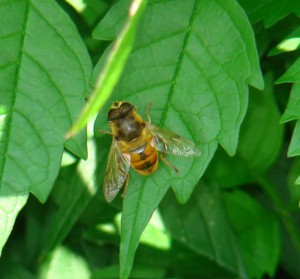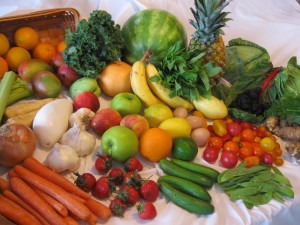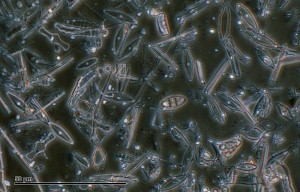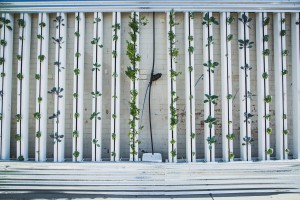

DE for Organic Green Garden
Diatomaceous Earth naturally does double time in the garden. It can destroy and deter insects which prey upon healthy gardens. DE may also be used in combination with potting soil or worked into garden plots. It does not harm earthworms when minor measures are taken and some individuals use it in their worm bins because it can actually be beneficial to them. DE assist in their digestive system which produces the castings that make the vermicompost nutritious. It should be sprinkled atop the surface, especially in worm bins. Diatomaceous Earth is a known drying agent so it is a good idea to keep a spray bottle of plain water handy to add moisture to the vermicompost. One of the key elements to creating healthy and natural compost it to maintain an appropriate moisture balance. Another important element is to ensure only food grade Diatomaceous Earth is used which is the only type of DE product that we offer. To be kind to wasps in the garden apply DE in the evening or late afternoon hours.
Diatomaceous Earth is tiny plant fossils which nick the bodies of insects and absorb the waxy moisture that their bodies are made of inevitably causing them to dehydrate. Due to the methodology of this organic insecticide pest can never become immune to its effects. Some of the garden pests DE is effective against are:

-
Aphids
-
Mites
-
Thrips
-
Ants
-
Slugs
-
Snails
-
Queensland Fruit Flies
-
Cucumber Beetles
The use of Diatomaceous Earth as an amendment for soil has been studied by the Southern Cross University in Australia. This testing showed that DE significantly increases the nutrient content of soil. It also reduced fertilizer leeching of the soil. This decreases the fertilizer’s impact upon the environment while improving its efficiency making it an organic and environmentally friendly pesticide.

Regular Food Grade Diatomaceous Earth from our quality product line is an excellent amendment for garden soil. Whether it is industrial farming or small scale gardening our DE offers cultivators many advantages. It contains less than 0.1% crystalline silica and provides nutrients to the soil such as magnesium; calcium; sodium; phosphorous; potassium; and selenium. Our food grade DE contains no toxic chemicals and is never artificially heat treated. It is an organic solution to several garden dilemmas.
Diatomaceous Earth on Hydroponic Gardening
 Diatomaceous Earth is the remains of ocean or freshwater plant life that has been fossilized and those fossils are referred to as diatoms. It is siliceous sedimentary rock which is soft and can be milled into different sizes which are used for many various purposes. Due to its shapes and absorbency is can be used as an abrasive, a filter, and/or a mechanical insecticide. A food grade version of DE can be used for most purposes including as a multi-efficient growing medium.
Diatomaceous Earth is the remains of ocean or freshwater plant life that has been fossilized and those fossils are referred to as diatoms. It is siliceous sedimentary rock which is soft and can be milled into different sizes which are used for many various purposes. Due to its shapes and absorbency is can be used as an abrasive, a filter, and/or a mechanical insecticide. A food grade version of DE can be used for most purposes including as a multi-efficient growing medium.
Growing Medium
Diatomaceous Earth may be used in hydroponic gardening as a growing medium. Food grade DE is natural; non-toxic; extremely absorbent; and possess a high level of porosity. While it holds water, the porosity lends breathability to the soil. Many gardeners add diatoms to potting soil for all types of houseplants. DE increases water retention capability in lighter soils and dilutes the sodium content of soil thereby reducing its salinity. It also helps the conversion of phosphorous in soil which is locked up.
Diatoms are widely used as an environmentally friendly solution to water storing crystals as well as an effective alternative to harsh insecticides. Its excellent absorbency is death for garden pests. The sharp edges of the diatoms pierces insect exoskeletons and dehydrates them. It may be sprinkled atop compost to prevent pests from using it as a breeding ground. It is not harmful to beneficial creatures such as earthworms. The key is to sprinkle it lightly and allow the worms to work it into the compost naturally. On another note it is not harmful to honey bees in the garden either as long as it is used in moderation.
Hydroponics

Diatomaceous Earth can be used in hydroponic gardening as it can retain a great deal of moisture and only release it when needed. It not only provides benefits such as water retention and insect protection, but also lends specific nutrients to the plants. Sugarcane for example is capable of assimilating silica into a usable form. The silica content of those without Diatomaceous Earth treatment is about 0.87% whereas those which received DE treatment possess a silica content of 1.44%.
Diatomaceous Earth is an excellent filter and it is believed to reduce the potential for root rot while increasing available nutrients. The addition of silica into the plants diet thickens the stem walls on a cellular level. Diatoms retain about 150% of their weight in water and can increase plant production up to 25%. The microscopic structures of each fossil provides thermal insulation and allows for increased aeration.

Using Diatomaceous Earth as a hydroponic growing medium will reduce required watering cycles. It is astoundingly environmentally friendly and 100% reusable. The granules may be washed thoroughly and soaked in a solution of 3 1/2 liters of water to 1 tablespoon of bleach. Another method of preparing DE for reuse is to soak for about 24 hours in an algaecide and then rinse it completely. It can be used as a total hydroponic growing medium replacement or mixed with traditional mediums such as clay pebbles or perlite.
Our Diatomaceous Earth is food grade and 100% natural with no chemical additives. We only use sunlight to dry our DE and it has an endless list of uses. It can be added to potting soil; dusted around fruit trees; and/or sprinkled on the top layer of all types of compost. The diatoms will assist in delivering nutrients as well as water while battling pests that harm gardens.
Author: DEO
Date Posted: 25 July 2017
Leave a comment





